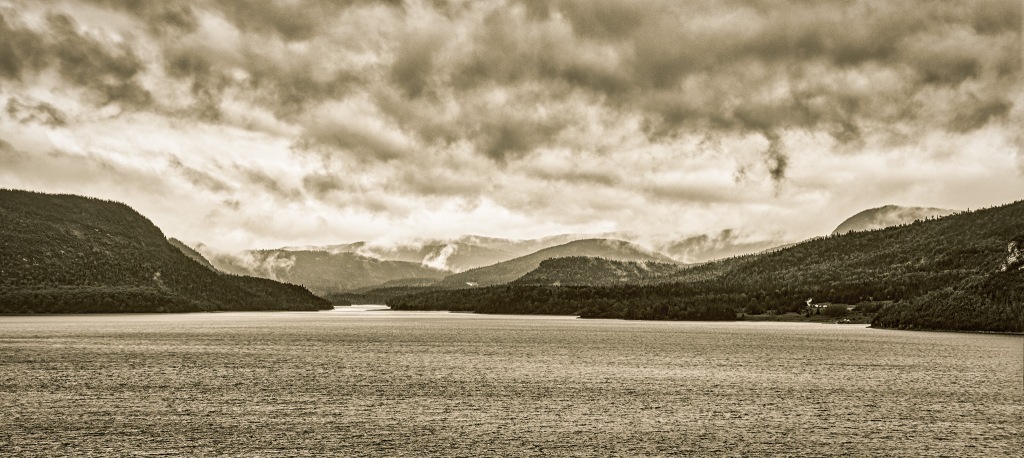Cloudy tendrils cling to hillsides
As a child to its mother on school’s first day
The bus driver beckons
Come, this way to new worlds
Mother’s kiss lingers on rosy cheek
Solid and eternal as the hills
Eternal as the Hills
East Arm
Highway 430
Gros Morne National Park
Newfoundland, Canada
Taken during travels, 2023
Patrick reads Solid as the Hills: with commentary.
I’m going to tell you what I think this poem means to me. So, if you like, go back and re-read it. Then think about what it means to you. Whatever that is, you’re right. A poem’s meaning is always a reflection of the reader’s state of mind, state of being. We can analyze the poet’s intended meaning all we want but, at least for me, the intention of a poem is to present a wordy kind of Rorschach image for the reader to find meaning in.
I also think it’s important for the poet, me, to realize I also need to be a reader. I figured out a while ago, no matter who I think I’m writing for, whenever I set words down on paper the words are almost always meant for me. More than that, the meaning they intend for me may not become apparent for minutes, hours, days or even years after the poem is published. That tricky old subconscious at work… or maybe something else? I’m not really sure. (A story for another time…)
I started working on the photograph for “Solid as the Hills” last night, fairly early in the evening. Words weren’t really connecting with it during the edit, which is usually where it happens. All I got was something a bit like the opening line: “Tendrils of cloud cling to the hillsides”. Nothing else offered itself in accompaniment.
With the photo in good shape, I watched a couple episodes of “Cold Case” and eventually went to bed with no more words to show for.
That’s where it stayed until about noon today when I sat in front of the laptop and committed to writing something down.
Looking at the photograph for inspiration, and adding some touch ups, a new image appeared in the form of a child clinging to its mother like those tendrils to the hills. The first day of school image of a mother and child waiting at the bus stop came hot on its heels.
There’s a tension there, for both mother and child. It’s one of life’s great transitional moments, leaving home for the first time to embark on a journey of discovery. But it also represents a first step toward separating a child from the safety and dependence of their mother and their home, and bittersweetness characterises the experience for both. The future can look a bit ominous for both, but there is also the promise of great new adventures, growth and success.
Of course, I am no longer that child. As a 63 year-old man, that experience is a nearly six decades-old distant memory and, to be honest, I can’t actually recall it, though I have no doubt something like it happened. Nonetheless, the words speak directly to me.
Changes are brewing in my life. Retirement, meaning, purpose, all these are in transition. And, to be frank, I haven’t been handling it all that well. The near future broods on my moods much like the gloomy clouds.
Add to that, my mother died a bit over a year ago after a long illness. I miss her presence, her warmth, her generous loving nature, the buttress of support she has always been. As my father died a long time ago, I am also now without any parents. There’s an odd change in my sense of being that just won’t resolve to words right now. Or maybe it’s implied in the poem: I’ve lost sight of the mountains.
So the poem reminds me: those mountains remain right where they’ve always been; my mother’s kiss, her love and support, will be there always, even though we’re parted. Walk bravely, Patrick, into the future, where new worlds yet are to be discovered.
Of course, none of this meaning was apparent while writing the poem. It’s a realization that only dawned on me while preparing the blog post for publication and reading it aloud for this podcast.
Messages to self sometimes take a bit of effort … a bit of allowance and accepting … to rise from unconscious to conscious. I suppose that’s another lesson here. Often, arranging the words that come to my mind into poems proves the most powerful way for me to create the space for those messages to rise, like tendrils from the hillsides.
